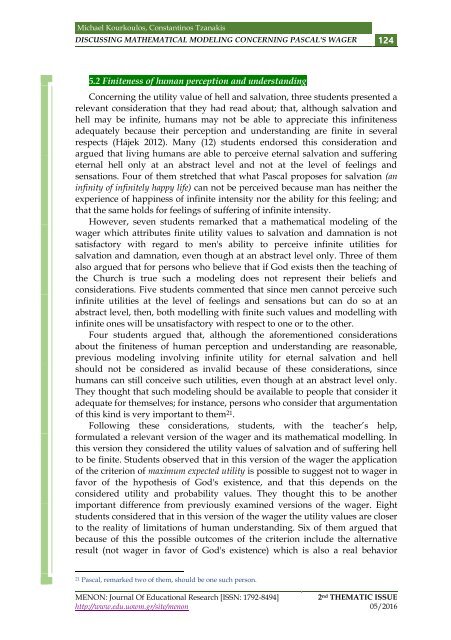MENON
menon_issue_2nd_special_052016
menon_issue_2nd_special_052016
Create successful ePaper yourself
Turn your PDF publications into a flip-book with our unique Google optimized e-Paper software.
Michael Kourkoulos, Constantinos Tzanakis<br />
DISCUSSING MATHEMATICAL MODELING CONCERNING PASCAL'S WAGER 124<br />
5.2 Finiteness of human perception and understanding<br />
Concerning the utility value of hell and salvation, three students presented a<br />
relevant consideration that they had read about; that, although salvation and<br />
hell may be infinite, humans may not be able to appreciate this infiniteness<br />
adequately because their perception and understanding are finite in several<br />
respects (Hájek 2012). Many (12) students endorsed this consideration and<br />
argued that living humans are able to perceive eternal salvation and suffering<br />
eternal hell only at an abstract level and not at the level of feelings and<br />
sensations. Four of them stretched that what Pascal proposes for salvation (an<br />
infinity of infinitely happy life) can not be perceived because man has neither the<br />
experience of happiness of infinite intensity nor the ability for this feeling; and<br />
that the same holds for feelings of suffering of infinite intensity.<br />
However, seven students remarked that a mathematical modeling of the<br />
wager which attributes finite utility values to salvation and damnation is not<br />
satisfactory with regard to men's ability to perceive infinite utilities for<br />
salvation and damnation, even though at an abstract level only. Three of them<br />
also argued that for persons who believe that if God exists then the teaching of<br />
the Church is true such a modeling does not represent their beliefs and<br />
considerations. Five students commented that since men cannot perceive such<br />
infinite utilities at the level of feelings and sensations but can do so at an<br />
abstract level, then, both modelling with finite such values and modelling with<br />
infinite ones will be unsatisfactory with respect to one or to the other.<br />
Four students argued that, although the aforementioned considerations<br />
about the finiteness of human perception and understanding are reasonable,<br />
previous modeling involving infinite utility for eternal salvation and hell<br />
should not be considered as invalid because of these considerations, since<br />
humans can still conceive such utilities, even though at an abstract level only.<br />
They thought that such modeling should be available to people that consider it<br />
adequate for themselves; for instance, persons who consider that argumentation<br />
of this kind is very important to them 21 .<br />
Following these considerations, students, with the teacher’s help,<br />
formulated a relevant version of the wager and its mathematical modelling. In<br />
this version they considered the utility values of salvation and of suffering hell<br />
to be finite. Students observed that in this version of the wager the application<br />
of the criterion of maximum expected utility is possible to suggest not to wager in<br />
favor of the hypothesis of God's existence, and that this depends on the<br />
considered utility and probability values. They thought this to be another<br />
important difference from previously examined versions of the wager. Eight<br />
students considered that in this version of the wager the utility values are closer<br />
to the reality of limitations of human understanding. Six of them argued that<br />
because of this the possible outcomes of the criterion include the alternative<br />
result (not wager in favor of God's existence) which is also a real behavior<br />
21 Pascal, remarked two of them, should be one such person.<br />
<strong>MENON</strong>: Journal Of Educational Research [ISSN: 1792-8494]<br />
http://www.edu.uowm.gr/site/menon<br />
2 nd THEMATIC ISSUE<br />
05/2016


